Hello and welcome to Episode 57 of Read Paradise Lost with me, Jane Davis, a podcast and Substack newsletter about my project to read all of Paradise Lost by John Milton, aloud, and with a sometimes word-by-word, sometimes line-by-line discussion. This is a one-take recording with no editing, so forgive noise of seagulls, my coughing, or sound of men drilling next door. Rough and ready reading is what you get.
See Episode 1 for an introduction to the project.

We are with Adam and Eve as they head homewards after their day’s work tending the garden. A short portion of just 40 lines this week.
In the online group a reader was troubled by our tendency to get stuck in difficult bits of Milton’s thought, where’s the poetry she cried. Milton takes us to the bower and then begins telling us what love is… Yes, fair enough, I had to agree. I feel we have to try to follow his thoughts, for after all, that is what the poem is…not just a work of beauty but also a work of thought. But there is poetry here, and it is important to feel it, despite the fact that my close reading method can get us stuck on a pinhead for hours. So let me begin by reading through this section.
This said unanimous, and other Rites
Observing none, but adoration pure
Which God likes best, into thir inmost bowre
Handed they went; and eas'd the putting off
These troublesom disguises which wee wear, [ 740 ]
Strait side by side were laid, nor turnd I weene
Adam from his fair Spouse, nor Eve the Rites
Mysterious of connubial Love refus'd:
Whatever Hypocrites austerely talk
Of puritie and place and innocence, [ 745 ]
Defaming as impure what God declares
Pure, and commands to som, leaves free to all.
Our Maker bids increase, who bids abstain
But our Destroyer, foe to God and Man?
Haile wedded Love, mysterious Law, true source [ 750 ]
Of human ofspring, sole propriety,
In Paradise of all things common else.
By thee adulterous lust was driv'n from men
Among the bestial herds to raunge, by thee
Founded in Reason, Loyal, Just, and Pure, [ 755 ]
Relations dear, and all the Charities
Of Father, Son, and Brother first were known.
Farr be it, that I should write thee sin or blame,
Or think thee unbefitting holiest place,
Perpetual Fountain of Domestic sweets, [ 760 ]
Whose bed is undefil'd and chaste pronounc't,
Present, or past, as Saints and Patriarchs us'd.
Here Love his golden shafts imploies, here lights
His constant Lamp, and waves his purple wings,
Reigns here and revels; not in the bought smile [ 765 ]
Of Harlots, loveless, joyless, unindeard,
Casual fruition, nor in Court Amours
Mixt Dance, or wanton Mask, or Midnight Bal,
Or Serenate, which the starv'd Lover sings
To his proud fair, best quitted with disdain. [ 770 ]
These lulld by Nightingales imbraceing slept,
And on thir naked limbs the flourie roof
Showrd Roses, which the Morn repair'd. Sleep on
Blest pair; and O yet happiest if ye seek
No happier state, and know to know no more. [ 775 ]
First, a bit of legislation from Milton - no need for churches, services, sanctioned payer books or anything else - what our Grand Parents did, simply, single-heartedly was to adore God. That was their evening prayer. Nothing else needed.
and other Rites
Observing none, but adoration pure
Which God likes best
As at the outset of the poem, Milton is without doubt about what kind of worship/relationship God prefers (Book1, line 17/18) ‘And chiefly thou O Spirit, that dost prefer/Before all temples the upright heart and pure.’ So here, simply adoration is the best form of prayer. That done, they go to bed.
into thir inmost bowre
Handed they went; and eas'd the putting off
These troublesom disguises which wee wear, [ 740 ]
Strait side by side were laid, nor turnd I weene
Adam from his fair Spouse, nor Eve the Rites
Mysterious of connubial Love refus'd:
‘Handed’ is important. The meaning is ‘hand in hand’, but ‘handed’ becomes more than that, becomes by their joint action jointly part of them, shifting from noun (each of them has a hand they offer to the other) to verb which combines them both in one. It is a verb form we will see again.
Adam and Eve are already naked, so they are free from ‘the troublesom disguises which wee wear’, and simply lie down together and begin to embrace. Sexual love is natural, straightforward, untroubled and involves the free and active participation of both them:
nor turnd I weene
Adam from his fair Spouse, nor Eve the Rites
Mysterious of connubial Love refus'd:
I think of Milton’s young first bride, leaving him after a few days of marriage. That sadness - whatever it biographically once was- seems to flood the lines here with a feeling of possible wrongness - ‘nor turned’ Adam/nor Eve refus’d.’ Perhaps it is that hidden negative feeling that provokes Milton to bring the ‘hypocrites’ into his thought and the bower. Adam and Eve behaved freely and happily
Whatever Hypocrites austerely talk
Of puritie and place and innocence, [ 745 ]
Defaming as impure what God declares
Pure, and commands to som, leaves free to all.
There is no need to have the ‘austere’ here. There is nothing ‘impure’. God lets us choose whether or not we choose to do it - priests, men, women. Indeed the hypocrites may be batting for the wrong team:
Our Maker bids increase, who bids abstain
But our Destroyer, foe to God and Man?
Haile wedded Love, mysterious Law, true source [ 750 ]
Of human ofspring, sole propriety,
In Paradise of all things common else.
Only Satan (our Destroyer) is behind the apparent call for the purity of no sex. Wedded, (like a legal form a of ‘handed’?) sexual intercourse becomes a ‘mysterious law’, and the ‘true source/ Of human offspring’.
Furthermore, it is, Milton says, the only form of ‘propriety’ (proprietorship) in Paradise, marriage law coming before property law, for everything else was held in common.
This may have been the point at which my fellow reader got a little irritated with Milton. You are in the Bower ! Give us love! But instead, he goes off on one, thinking about what marriage gives humans:
By thee adulterous lust was driv'n from men
Among the bestial herds to raunge, by thee
Founded in Reason, Loyal, Just, and Pure, [ 755 ]
Relations dear, and all the Charities
Of Father, Son, and Brother first were known.
Here’s a distinction then, between married love and adulterous lust, which seems ‘bestial’ to Milton. We have reason and thus can develop relationships based in ‘Reason, Loyal, Just, and Pure’. And thus to a wider family love, or charity, perhaps. (I’m thinking here, again, of Milton’s first marriage, to Mary Powell, and his offering of his home to her (Royalist) family later in the civil war).
So, to make clear, Milton, states his thoughts on married love:
Farr be it, that I should write thee sin or blame,
Or think thee unbefitting holiest place,
Perpetual Fountain of Domestic sweets, [ 760 ]
Whose bed is undefil'd and chaste pronounc't,
Present, or past, as Saints and Patriarchs us'd.
And goes on to make a further distinction:
Here Love his golden shafts imploies, here lights
His constant Lamp, and waves his purple wings,
Reigns here and revels; not in the bought smile [ 765 ]
Of Harlots, loveless, joyless, unindeard,
Casual fruition, nor in Court Amours
Mixt Dance, or wanton Mask, or Midnight Bal,
Or Serenate, which the starv'd Lover sings
To his proud fair, best quitted with disdain. [ 770 ]
The golden shaft, the lights, the lamps, the purple wings, the revels…all good married love, all full of lively excitement and erotic joy. Not to be compared to ‘the bought smile/of Harlots…’ nor ‘Court Amours’ For in a fallen world, of course, there are corrupted forms of sex, as we know, because we saw Satan copulate with Sin and produce Death…But let us not thinks of that now. But rather, look back to Adam and Eve,
These lulld by Nightingales imbraceing slept,
And on thir naked limbs the flourie roof
Showrd Roses, which the Morn repair'd. Sleep on
Blest pair; and O yet happiest if ye seek
No happier state, and know to know no more. [ 775 ]
A moment of peace, joy, fulfillment - a state beyond which there is no happier. If only, Milton sighs, it could have stayed like this. If only we had known ‘to know no more’.
More next week.






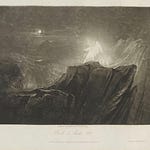
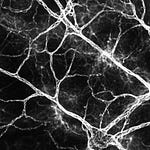
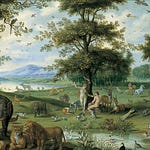
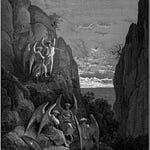
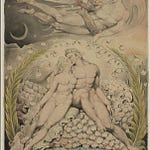
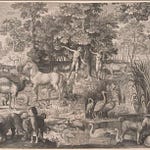
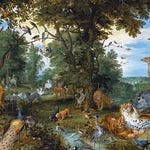
Share this post